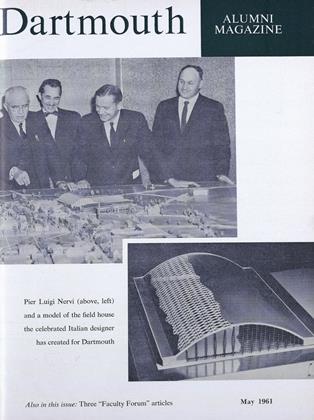By William J. Bryant '25.Hanover: Westholm Publications, 1961.131 pp. $7.50.
This distinguished, fascinating, and handsome book - sixty vignettes and sixty accompanying color photographs, combining inspiration for the mind and entrancement for the eye - has but one serious fault. It should reach many thousands of readers, and this may be precluded by its cost. Forgo that fifth of 100 proof bourbon, or two or three movies, or a few choice prime steaks or delicacies. Purchase this little gem for your bedside table, and perhaps send a second copy to a cherished friend.
It's a rather unique work of art and of thought. Hundreds of books of lovely colored photographs have been published, but generally covering a specific or pertinently related subject matter. Thousands of books have been published expounding the author's philosophy or definite philosophical thought. Flames of Life, however, "has no theme. It is as random as life itself." And therein lies its charm.
Small though the volume may be, there is hardly a subject of our modern life that is not discussed or brought to mind by indirection — in choice, poignant, economical phrases or sentences. Yet turn a leaf or two and you are in the indefinite, contemplative, quiet, and enjoyable life of countless past generations - mountain climbing, fishing, hunting, seeking happiness and enjoying being alone. "The Evils of Bigness" with its photograph of the New York skyscrapers forming a background for a modern superliner, follows "Increasing the Mind's Capacity" with its photograph of a Vermont autumn-foliaged hillside reflected in a quiet secluded pond.
William Junior Bryant's interest in and contemplation of life is all-embracing, and without question progressive and cumulative. It seems relevant to point out that he is not a professor, an editor, a librarian or a professional writer - nor indeed a professional photographer. Thirty-eight years of his life were spent with one of the great machine tool companies of America in a succession of positions from part-time machinist to chairman of the board of directors. In this same period his many avocations included archaeology, reading, travel and thought.
Space prevents the inclusion of dozens of quotations, but here are two: From "Education": "This comprehension of environment reaches its ideal in the mature man - one who sees his part of the whole; who understands other viewpoints than his own; who senses the relativeness of truth, the pitfalls of dogmatism, and the essential amoral forces of nature. He can then accept life as given him with a quiet sense of humor - most essential ingredient of character with which to face the random uncertainties of being alive."
From "The End of Infinite": "The extent of time has been extended on both ends of the scale in recent years. The universe turns out to have an age of more than ten billion years. The earth's age lengthens as our measuring techniques improve. At the other end of the scale, we learn of lives of subatomic particles in terms of millionths of a second."
We trust June Bryant will not mind being labelled a well-rounded man, nor that we suggest that his stimulating, inspired, and thoroughly enjoyable book, at least partially, is a product of the Dartmouth experience - a realistic living proof of the value of a liberal arts education when assimilated, enkindled, and fanned-on by an active and inquisitive mind.
 View Full Issue
View Full Issue
More From This Issue
-
 Feature
FeatureArms Control in a Cold War
May 1961 By GENE M. LYONS, -
 Feature
FeatureThe Human Revolution and World Peace
May 1961 By RICHARD W. STERLING, -
 Feature
FeatureThe Impact of Defense on the Economy
May 1961 By GEORGE E. LENT, PROFESSOR -
 Feature
FeatureThe Commitment of Teaching
May 1961 By FRANKLIN SMALLWOOD '51, -
 Feature
FeatureTwo Student Projects for Peace
May 1961 By D.E.O. -
 Feature
FeatureNervi Designs a Field House
May 1961
FORD H. WHELDEN '25
-
 Article
ArticleA Survey of Geographical Distribution
May 1933 By Ford H. Whelden '25 -
 Article
ArticleFifty-Two Years of Dartmouth Football
February 1934 By Ford H. Whelden '25 -
 Class Notes
Class NotesDetroit Club
May 1935 By Ford H. Whelden '25 -
 Class Notes
Class NotesDetroit
October 1938 By Ford H. Whelden '25 -
 Books
BooksOIL FOR THE WORLD,
January 1951 By FORD H. WHELDEN '25 -
 Feature
Feature"The Record of Their Fame"
December 1954 By FORD H. WHELDEN '25
Books
-
 Books
BooksNew Modern Poets
JUNE 1967 -
 Books
BooksTHE NEW CROSS-COUNTRY SKI BOOK.
JANUARY 1972 By DAVID BRADLEY '38, M. D. -
 Books
BooksJONES VERY: THE EFFECTIVE YEARS,
NOVEMBER 1967 By EDWARD M. POTOKER '53 -
 Books
BooksALL THE BEST IN THE CARIBBEAN INCLUDING PUERTO RICO AND THE VIRGIN ISLANDS.
JULY 1972 By JOHN HURD '21 -
 Books
BooksFaculty Books
January 1953 By JUDSON S. LYON '40 -
 Books
BooksTHE BRITISH IN NORTHERN NIGERIA.
JANUARY 1970 By LEO SPITZER

